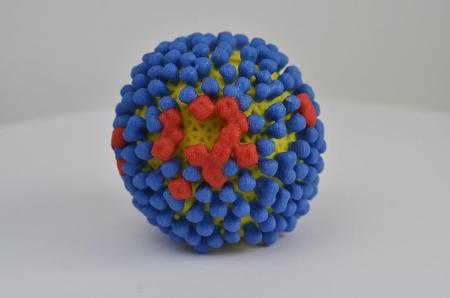Clinical trial testing topical cream plus influenza vaccine in progress
A Phase 1 clinical trial examining whether a topical cream can enhance the immune response conferred by a “pre-pandemic” influenza vaccine is underway at Baylor College of Medicine in Houston. Investigators are evaluating whether imiquimod cream, which is commonly used to treat genital warts and certain skin cancers, can boost the body’s immune response to an H5N1 influenza vaccine.

3D print of influenza virus. The virus surface (yellow) is covered with proteins called hemagglutinin (blue) and neuraminidase (red).
H5N1 is an avian influenza virus that causes severe respiratory illness in birds. In rare circumstances, humans have contracted H5N1 influenza through direct or indirect contact with infected birds, such as poultry. Infections in people can be serious and deadly — the World Health Organization reported 860 cases of H5N1 influenza, 454 of them fatal, from 2003 through July 20, 2018 (link is external). H5N1 influenza currently does not spread easily from human to human. However, like all influenza viruses, the virus undergoes constant genetic changes, and it is possible that it may become more easily transmissible and cause a pandemic.
Participants in the VTEU trial will receive an H5N1 vaccine (manufactured by Sanofi Pasteur, based in Swiftwater, Pennsylvania) that was designed for use in a potential pandemic. The vaccine, developed with some NIAID support, is made from an inactivated, or “killed,” influenza virus. After the vaccine was approved by the Food and Drug Administration (FDA) (link is external) in 2007, it was added to the National Pre-pandemic Influenza Vaccine Stockpile.
“NIAID is pleased to support a clinical trial evaluating an innovative way to boost immune responses to a pre-pandemic vaccine,” said NIAID Director Anthony S. Fauci, M.D. “The Vaccine and Treatment Evaluation Units remain a crucial component of our pandemic influenza preparedness efforts.”
Imiquimod cream activates the innate immune system — the body’s immediate defense against invading pathogens. Investigators in Hong Kong recently conducted two clinical trials of imiquimod cream and seasonal inactivated influenza vaccine. One clinical trial enrolled elderly participants, and the other enrolled young adults. The imiquimod cream was generally well-tolerated, and elderly and young participants who applied the cream before vaccination generated significantly more robust immune responses than those in control groups who did not receive imiquimod.
The immune-boosting properties of imiquimod could stretch the supply of H5N1 vaccines because fewer doses would be required to achieve sufficient immunity in recipients. This would allow more people to be vaccinated in an outbreak.
Hana M. El Sahly, M.D., associate professor, Department of Molecular Virology and Microbiology at Baylor College of Medicine, serves as the principal investigator for the clinical trial. All trial participants will receive two intradermal doses of the H5N1 vaccine, 21 days apart. Intradermal delivery with a needle and syringe requires a precise technique of inserting the needle in the skin at a certain angle. To reduce variability, study clinicians are using a microneedle injector, the MicronJet600 (manufactured by NanoPass, based in Ness Ziona, Israel), to deliver the vaccine.
Participants will be randomly assigned to one of two treatment groups. One group will have Aldara (FDA-approved imiquimod cream manufactured by Valeant Pharmaceutical International, Inc., based in Laval, Canada) applied to their upper arm before each vaccination. The cream, which is supplied in single-use packets, is rubbed in so that it is fully absorbed. After waiting approximately five to 15 minutes, clinicians will then administer the vaccine to the upper arm where the cream was applied. The same process will be followed in the control group; however, instead of receiving imiquimod cream, control group participants will have a placebo aqueous cream applied in the same fashion before both vaccinations. The trial is double-blind, meaning the participants and the investigators do not know who received each type of topical cream. Study clinicians will monitor participants for any injection site reactions such as redness and swelling, or other reactions such as fever, headache or nausea. After each injection, participants must refrain from washing their arm for four to six hours.
Participants will return to the clinic at regular intervals over the course of 7 months to have blood drawn so that investigators can test samples for an immune response. After each vaccination, participants will take home a diary card to record any symptoms and medications taken at home. An independent data and safety monitoring committee will review participants’ clinical and safety data at specified time points and otherwise as needed.
Source: U.S. National Institutes of Health
- 270 reads
Human Rights
Ringing FOWPAL’s Peace Bell for the World:Nobel Peace Prize Laureates’ Visions and Actions

Protecting the World’s Cultural Diversity for a Sustainable Future

The Peace Bell Resonates at the 27th Eurasian Economic Summit

Declaration of World Day of the Power of Hope Endorsed by People in 158 Nations

Puppet Show I International Friendship Day 2020

